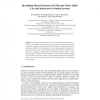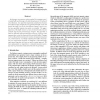464 search results - page 2 / 93 » Memory Based on Abstraction for Dynamic Fitness Functions |
CDC
2010
IEEE
12 years 11 months ago
2010
IEEE
Abstract-- We consider reinforcement learning, and in particular, the Q-learning algorithm in large state and action spaces. In order to cope with the size of the spaces, a functio...
EVOW
2005
Springer
13 years 10 months ago
2005
Springer
Abstract. In domains such as music and visual art, where the quality of an individual often depends on subjective or hard to express concepts, the automating fitness assignment bec...
CEC
2007
IEEE
13 years 11 months ago
2007
IEEE
—Target shape matching can be used as a quick and easy surrogate task when evaluating optimization algorithms intended for computationally expensive tasks, such as turbine blade ...
DAGM
2007
Springer
13 years 11 months ago
2007
Springer
Abstract. Model-based image interpretation extracts high-level information from images using a priori knowledge about the object of interest. The computational challenge is to dete...
ICDE
1999
IEEE
14 years 6 months ago
1999
IEEE
In this paper we present an online method for managing a goaloriented buffer partitioning in the distributed memory of a network of workstations. Our algorithm implements a feedba...


